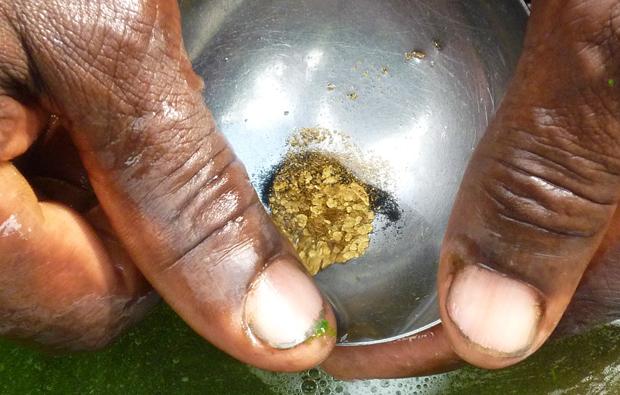Colombian miners looking to more environmentally friendly gold mining process
For producing chemical-free gold, Green Gold miners receive a 15 percent premium over the international price of gold from an organization called Fairtrade and Fairmined Gold. (Photo by John Otis.)
In the northern Colombian department of Choco, gold buyer Alfredo Hurtado walks across a bulldozed stretch of jungle the size of a football field.
It’s a former gold mining site, and it’s littered with slag heaps and pits of contaminated water.
The miners who worked here just wanted the gold, Hurtado says.
“They don’t care if the land is turned upside down,” he lamented.
Hurtado says this kind of wasteland is a common sight in Colombia. With gold demand booming around the world, production is booming in Latin American. Colombia ranks among the world’s top 15 producers. About half of its production is extracted by small-scale miners and illegal prospectors — who often leave behind a ravaged and badly polluted landscape.
One of the biggest problems is mercury. Many miners use the toxic metal to separate the gold from the ore in which it’s found.
But exposure to mercury can cause serious and permanent health problems, including brain damage and birth defects. And Colombians are exposed to huge amounts of it. A recent United Nations report found that Colombian mining is the world’s largest mercury polluter, per capita.
But these days, the country is also ground zero for a new movement to clean up small-scale mining. It’s called Oro Verde, or Green Gold.
One project is on display right here in Choco.
Alongside a small mountain river, Miner Luis Palomino picks a few leaves from a balsa tree and stirs them in a wooden bowl filled with water and sediment from the river. The leaves create a soapy film that attaches to the lighter minerals and can be washed away, leaving behind heavier flecks of gold.
They do basically the same thing as mercury, but without the health risk.
The technique was passed down by Palomino’s ancestors, former African slaves. Palomino says it’s slower and extracts less gold, but he has no interest in using mercury.
“We’ve mined gold like this all our lives,” he said.
And because the technique is chemical-free, Palomino earns a 15 percent premium over the world price for gold through a UK-based outfit called Fairtrade and Fairmined.
Green Gold project director Felipe Arango says Fairtrade and Fairmined gold costs more, but he believes there’s a market for it.
“Our bet is that if we can attach a value to it and if we can get consumers to recognize it, it should be enough,” Arango said. “The forests and the ecosystems that are around these mines should be more valuable than the gold itself.”
The idea behind these and other efforts is to do for gold mining what the organic and fair trade movements are doing for food production.
“This is a sector that can transform itself,” says Lina Villa, who heads the Alliance for Responsible Mining in Medellín.
Her organization promotes techniques that cut back on mercury use, but don’t eliminate it altogether. Things like better storage and handling techniques can reduce accidents and toxic emissions, and miners who adopt them are eligible for a 10 percent bonus from Fairtrade and Fairmined.
“Miners are willing to change and to do things in a different way,” Villa said. “Once you have that evidence that change is possible, not embracing change doesn’t make sense.”
Fairtrade and Fairmined hopes to sign up legions of miners across Latin America, Africa and Asia. Small-scale prospectors like these make up 90 percent of the world’s gold mining labor force.
But so-called responsible mining has been slow to catch on. Mining with less mercury takes longer and is less profitable, even with the premiums.
That may be why just 1,400 miners in Colombia, Peru and Bolivia have so far joined the Fairtrade and Fairmined movement.
Supporters aren’t discouraged, though. Arango points out that campaigns for fair-trade coffee and chocolate also started slowly and are now booming.
“This is the beginning,” Arango says. “Right now the volumes are small, but we are starting to see consumers and the mining industry paying attention to a different way of doing things.”
And for the miners in Choco, those different ways of doing things bring more than health advantages.
As she takes a break from shoveling, Green Gold miner Mariveth Mosquera points to patches of land that have been restored after excavation, and which now sprout crops like yucca and plantains. The premiums she and her family receive for their eco-friendlier approach have also helped them build fish ponds with mercury-free water to cultivate tilapia.
“Yes, mining like this is harder,” Mosquera says. “But mercury would kill the fish. It would affect everything. Working without mercury is better.”
